The Cardboard Republic has rolled out the annual Laurels of the Republic awards, celebrating the best new games released in 2017 for each of the gamer archetypes. What follows are the finalists for one of those groups.
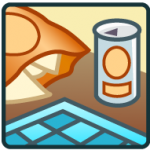 There are few things that Socializers want more out of games than a means to engage with other players as much as possible. If they were a clan, their credo would be ‘Light on Rules, Heavy on Interaction’. Games to this group are less about picking out intricate strategies or figuring out a way to win at any cost than they are about a means to collectively enjoy spending time with other people. As a result, this group prefers games that either have short and simple playthroughs or those that permit them the opportunity to, well, socialize with other players.
There are few things that Socializers want more out of games than a means to engage with other players as much as possible. If they were a clan, their credo would be ‘Light on Rules, Heavy on Interaction’. Games to this group are less about picking out intricate strategies or figuring out a way to win at any cost than they are about a means to collectively enjoy spending time with other people. As a result, this group prefers games that either have short and simple playthroughs or those that permit them the opportunity to, well, socialize with other players.
And with that, here are The 2017 Laurel Finalists for Socializers:
Honorable Mention: Kokoro: Avenue of the Kodama
Publisher: Indie Boards & Cards | Players: 1-8 | Play Time: 30 Minutes
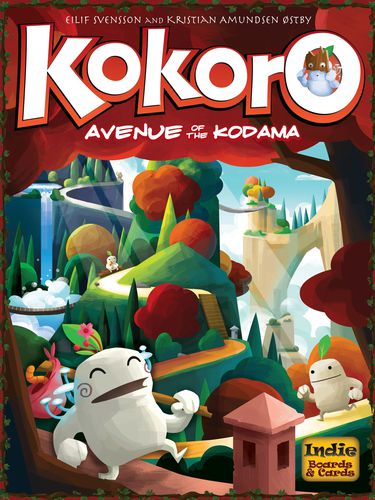
Some games try to hook you with deep strategies, rich themes, or complex mechanics. And then there are games like Kokoro: one of the most appealing games about drawing lines on a map.
Although officially released in fall 2017, Kokoro is the rethemed iteration of 2016’s Avenue by Aporta Games, which never saw widespread distribution in North America. It finally reached us when Indie Boards & Cards incorporated it into their woodland spirit-inspired Kodamaverse.
In either case, the core of this laid-back game remains about as rudimentary you can get: create a connected line of ever-increasing point value.
That’s it.
Each game players are provided gridded maps with numerous spaces containing plants, caterpillars, or a handful of lettered spirit sanctuaries. Every round, cards are systematically revealed from a deck depicting either a straight or angled line, which each person must then add to an unused square on their map. This deck also randomly determines when each round ends, triggering a scoring. During scoring, you count the number of icons you can connect in a continual line back to the sanctuary currently being scored. As long as your number of icons is higher than the previous round, you get that many points. Otherwise you get nothing. In the end, whoever has the highest score wins.
Although mostly a game of chance and light spatial tactics, don’t mistake Kokoro’s simplicity as undeveloped. Indeed, what makes Kokoro so rewarding is the relaxed approach the game simultaneously affords to groups of up to eight people at a time. Players can progress through its concise playthroughs at their own speed, engendering not only a pleasantly casual gaming experience but also leaving ample room for conversation at the same time, and making Kokoro one forest setting where Socializers can see the forest for the trees.
The Nominees

Number Five: Go Nuts for Donuts
Publisher: Gamewright / Daily Magic Games | Players: 2-6 | Play Time: 20-30 Minutes
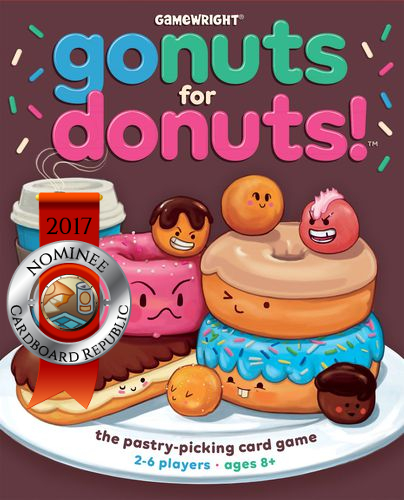 We had never thought anthropomorphized donuts would be a thing, but now that they are, the world is undeniably a better place for it.
We had never thought anthropomorphized donuts would be a thing, but now that they are, the world is undeniably a better place for it.
Existing alongside Gamewright’s other delicious lightweight food-based game Sushi Go!, Go Nuts For Donuts serves up a slightly different social experience with equally appealing results by swapping out card drafting with action selection. In this straightforward game of collecting pastry pals, each round a number of cards are laid out in a row, with each slot being assigned a number. Each player then secretly chooses a matching numbered card from their hand for the donut from the table they wish to procure. Everyone then reveals their choices. If you’re the only one who chose your specific donut, then you add it to your pile and resolve any effects it may have. If two or more people try to grab for the same one, however, then that donut is sadly discarded with no one getting it. Once the deck runs out, everyone adds up the point value of their box o’ treats to determine the winner.
Like a real box of traditional breakfast goodies, Go Nuts For Donuts never claims to be reinventing the wheel with groundbreaking innovation or a deeper premise hidden within like certain jelly-filled confectionaries. Nor does it need to be. Instead, it wins you over by doing precisely what makes the game so worthwhile in the first place: being a charming, interactive game with simple rules, a quick play time, and some positively appetizing artwork.
In other words, it’s exactly the kind of game that Socializers are drawn to. Go Nuts For Donuts is an affable blend of entertaining gameplay and casual social interaction that’s approachable, accessible, and doesn’t get stale after a couple playthroughs.
It’s is also just really fun to say.
Number Four: Flamme Rouge
Publisher: Stronghold Games / Lautapelit | Players: 2-4 | Play Time: 45 Minutes
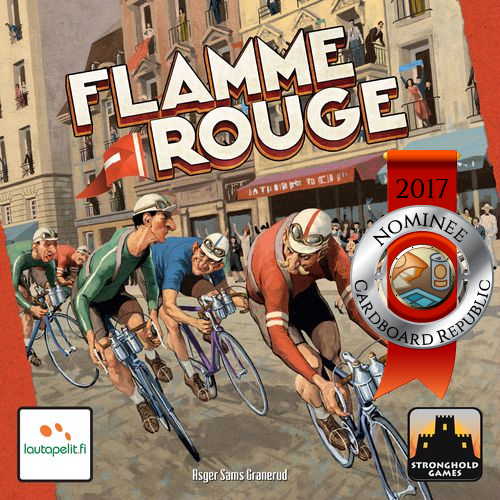 Racing games are hardly unique to board gaming. They were one of the earliest genres to develop, in part due to their relatively simple rulesets and a premise so fundamental that nearly everyone can understand.
Racing games are hardly unique to board gaming. They were one of the earliest genres to develop, in part due to their relatively simple rulesets and a premise so fundamental that nearly everyone can understand.
Go. That Way. Now. Get there before everyone else.
When it comes to the variety of themes, however, the racing genre can be a little lacking. For every game about plotting space ships through the void, trekking through some forgotten island, or jockeying a host of different animals, the vast majority of racing games are about cars, cars, and more cars.
It’s refreshing, then, when one comes along showcasing something other than chrome and asphalt. Especially when it encompasses the distinctiveness of that racing style so perfectly – as is the case with Flamme Rouge and competitive cycling.
Flamme Rouge started getting acclaim almost immediately after Essen 2016 and had a substantial table presence at that year’s BGG.Con – with good reason. The game is strategic yet lightweight, casual yet substantive, and it’s far more thematically resonant than it initially seems. So it’s no surprise that it was picked up for a 2017 release in the US.
Although the game provides a highly modular setup, each playthrough works the same way: every round, players draw and choose a card from each of their cyclists’ decks. Then everyone reveals their picks and the racers move ahead the denoted card number. Rinse and repeat until someone gets one of their cyclists across the finish line.
The most laudable part of the game though is its ability to capture the flavorful elastic tension inherent to the sport. Because each card can only be used once, and those at the front of the pack (or with gaps between groups of bicyclists) must add far-from-ideal exhaustion cards to their decks, the game creates a desire to remain close to one another and conserve your more explosive cards until it’s time to pull away.
You know, like real bike races.
All of this is done at relatively leisurely pace, giving you plenty of time to make basic decisions while also fostering table conversation as the race unfolds before you. With ample room for quick turns and social engagement, Flamme Rouge is ideal as a racing game Socializers have little issue slipstreaming right into.
Number Three: Magic Maze
Publisher: Dude Games / Sit Down! | Players: 1-8 | Play Time: 15 Minutes
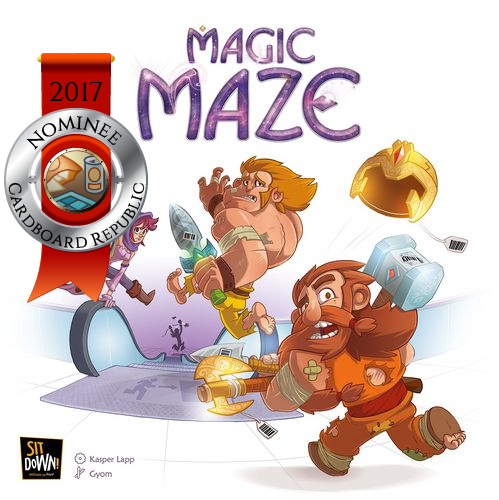
Are you able to handle basic colors and cardinal directions? If so, then you’re in luck! That’s all you need in order to play Magic Maze.
Easily the most frenetic nominee on this list, Magic Maze is a real-time Co-Op game where each player is given a simple-yet-vital job as you guide a group of NPCs through a mall. See, a group of adventurers have lost all their equipment and have made a side quest over to the local shopping center to, erm, “borrow” some new weaponry.
Our heroes, ladies and gentlemen.
Over a scant few minutes, the group must explore various mall tiles, locate and move each of the four NPCs to their matching colored item spaces, and then move them again to their respective exit squares. If the sand timer ever runs out, you are captured by whatever the Tolkien equivalent of Paul Blart is and are forced to retire. Because you will never live that fact down.
Simple in concept but challenging in execution, Magic Maze conjures up a trifecta of highly interactive traits that gives it its well-received reputation. The first is the aforementioned timed aspect. Second, each person is given a unique ability, such as flipping over new tiles or moving characters to the left, ensuring everyone has a role to play. Third, and perhaps most devilishly, once the timer starts no one can talk to or gesture to one another. Instead, the group must live or die on the tried and true ol’ cliché: teamwork.
It doesn’t take a wizard to see why Magic Maze made this year’s list. It’s an exceedingly creative game that piles everything Socializers like into one box: it’s lightning fast, incredibly short, effortlessly easy to teach, keeps everyone involved, and it does this all without becoming stale or predictable.
Number Two: Escape Room In A Box: The Werewolf Experiment
Publisher: Mattel | Players: 2-8 | Play Time: 45-90 Minutes
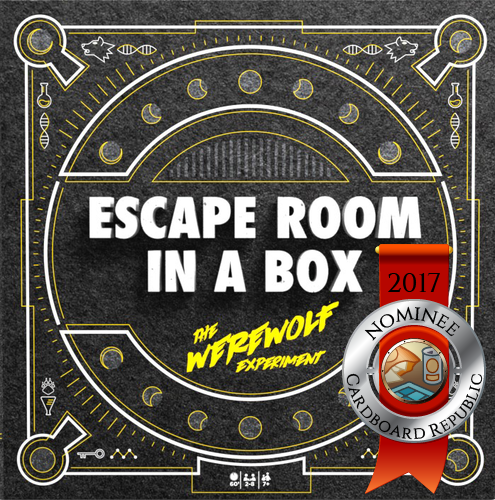
If you played games in 2017, odds are at least one was an escape room. Consisting of one part puzzle solving, one part social engagement, and one part legacy-style gameplay, escape room games attempt to partially recreate the experience of a full-scale escape room…except at a fraction of the price and you don’t have to leave your house.
Yet while many have garnered widespread attention, the most notable is actually one of the very first – even if it took a while to get to market. First Kickstarted in early 2016, Escape Room in a Box: The Werewolf Experiment eventually debuted in the summer of 2017, alongside news that it had been picked up by Mattel.
Like all escape rooms, players have to open the box, decipher clues to unlock various puzzles, and ultimately solve the game before your time runs out. In this case, you’re been exposed to a virus that’ll turn you into mangy, angry, ill-tempered lycanthropes unless you can find the antidote.
No pressure.
What makes The Werewolf Experiment rank so highly against its competition is that the game contains numerous actual physical puzzles to figure out and the order that you tackle them isn’t as linear as similar titles, giving you the freedom to explore its puzzles and trade off as needed. The degree to which Werewolf Experiment simulates the sensation of a full-fledged lock-in is simply unmatched at present. It fosters a highly interactive collaborative experience with a bunch of head-scratching riddles that can be as maddening to tease out as they are rewarding to solve, culminating in an excellent team-based exercise that Socializers will howl over.
In fact, this hairy little title was our Socializer Laurel bet for much of the year. And it nearly ended up that way too, if not for another game that happened to be hiding in plain sight…
The Winner
2017 Socializer Laurel – Word Slam
Publisher: Thames & Kosmos | Players: 3-Any | Play Time: 45 Minutes
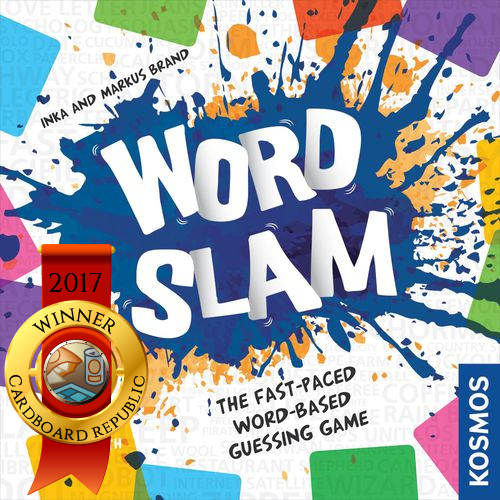
Do you think you can convey the name George Washington to a group of people solely be using a couple dozen generic description cards? How about The Shawshank Redemption? Hot air balloons? Pokemon?
Good, then you’re ready. Here we go. Word. Slam!
Like many games, Word Slam made its formal and highly unassuming first appearance at Essen 2016, but it went largely unnoticed for months, even after making its way to North America. Luckily its star has been on the rise recently, thanks in part to more people finding out about a highly interactive, highly social word game that can be taught in minutes and handle group sizes into the dozens. If you enjoy team-based social games, to ignore Word Slam would be a mistake.
In Word Slam, players are split into two teams, with each side getting identical decks of descriptor cards. Each round, one person from each side sits down and a word is chosen from among four increasingly challenging deck options. Once underway, both players scramble to get their side to guess the word(s) correctly first by using any combination of cards at their disposal – all without talking or gesturing. Cards can be added, removed, and rearranged at will though, providing the leader with freedom and flexibility to guide their team while sidestepping the pesky need to be any kind of literary expert.
And while World Slam certainly has rules over which side technically wins, that’s far from the point. This is a game where the fun comes from the game’s high-energy engagement between players far more than what the score may be, which is exactly why Socializers will be drawn to it. With a rudimentary premise and an atmosphere that’s equally electric, dynamic, and raucous, there’s little shock why Word Slam earned this archetype’s top spot for 2017.
![]()
Word Slam Contest!
We thought about different ways to celebrate the winner of this year’s Socializer Laurel, including trying to organize a 50 player streaming version of the game and researching different ways to highlight the ‘slam’ part of Word Slam. The former turned out to be a logistical nightmare, and the latter old end up pointing us to things involving professional wrestling or poetry slams. And, well, neither of those would probably go over well. Even by combining them. (We sketched it out.) In the end we opted for the most direct approach: providing one lucky winner with the opportunity to enjoy the award-winning game first hand. So that is what we’re going to to do right…now.
That’s right! Enter below for your chance at your very own copy of Word Slam!
![]()
Be sure to check out the 2017 Laurel Award pages for the other archetypes once they go live!







